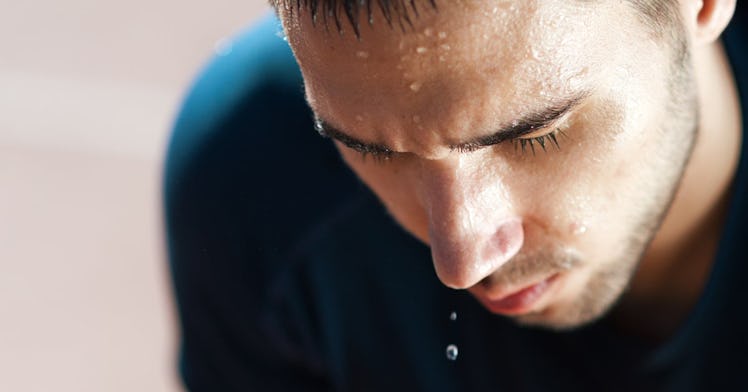7 Scientific Things About Sweat That Will Make You Go “Ew”
Sweating doesn't actually make you stink or lose weight.

Sweat has the unique ability to be both a point of pride and exceedingly embarrassing. When you’re at the gym dripping sweat after an intense workout, you might feel gratified as it slides off your dewy physique. But if you’re in the boardroom giving a presentation, you’re more likely to feel a sting of shame as sweat seeps through the pits of your newly pressed button-down. Whether you hide or flaunt it, sweating is something we all do but know little about. We’re meant to sweat and for good reason. Here’s what the research says about the science of sweat.
Your Sweat Doesn’t Stink
Despite what your BO might make you think, sweat itself doesn’t smell. According to Cleveland Clinic, sweat is made in the eccrine and apocrine glands. Although the sweat itself doesn’t smell, when it mixes with bacteria on the skin, apocrine gland sweat — found in glands on the feet, genitals, and armpits — can produce a noxious odor. So the next time you’ve got that not-so-fresh feeling, blame the bacteria.
A Good Sweat Doesn’t Always Equal Weight Loss
Sweat production varies quite a bit from person to person. This means that after a workout, you could have sweated a bunch because of your intense fat-burning regimen, or it could just be that it’s really hot and your body is trying to turn down the temperature. Bikram yoga — a type of very hot yoga where practitioners repeat the same 26 poses each class — is a great example. Practitioners have long claimed that a single sweaty session could result in burning a whopping 1,000 calories, but research has shown this to be a giant myth. One sesh more likely results in around 300 calories burned, the equivalent of walking briskly for an hour. Bikram’s intensely sweaty experience more likely results from your body’s attempts at adjusting to the lava hot room.
Sweat Contains a Dash of Pee
Your sweat is mostly water, but if you taste it (I know, gross!) you might notice that it tastes a bit sweet. That’s because there’s slightly more to it than just H2O. Although sweat is 99% water, it does contain a dash of pee — the remaining 1% is made up of a combination of ammonia, lactic acid, vitamin C, uric acid, and urea, the main component of urine.
Your Morning Joe Might Make You Sweat
You might have noticed that when you drink a few cups of coffee, you sweat more than usual. But instead of reapplying your favorite deodorant, consider holding off on that second cup o’ joe. Research published in the journal Medicinal Food found that caffeine can cause an increase in sweat production. This also means you should avoid soda, energy drinks, green and black tea, and dark chocolate before any big presentations.
Night Sweats Are Worth Noticing
Night sweats in men have an entirely different purpose than they do in cisgender women, for whom it’s often a result of a loss of estrogen in the years before and during menopause. In cis men, night sweats could be a sign of low testosterone, which can cause depression, fatigue, and erectile dysfunction. Night sweats could also be the result of chronic stress and anxiety, sleep apnea, or certain medications. In any case, if you’re waking up soaked, it’s worth talking to your doctor.
Sorry, But Sweat Pimples Are Real
Sweat can cause a damp environment, which contributes to the bacteria that make your skin break out. And although sweat doesn’t directly cause pimples, it can increase the production of sebum, an oily substance that causes the sweat pimples you despise. But don’t cancel your workout just yet. A good face and body wash post-workout can do a lot to stop sweat pimples in their tracks.
A Good Sweat Detoxifies Your Mind More Than Your Body
We all know that a good workout is fantastic for your mental health. It releases endorphins and boosts levels of serotonin in the brain. But we’ve also heard time and time again that a good sweat is detoxifying. From infrared saunas to sweat lodges, sweating is all the rage in the wellness world. But it’s mostly a tool for regulating your temperature. Sweating does remove some heavy metals from the body, but according to a review in the journal Temperature, the liver and kidneys do most of the work by far.